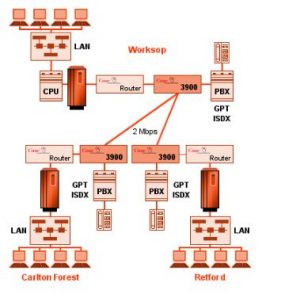Serving a population of more than 100,000, Bassetlaw District Council is one of eight district authorities in the county of Nottinghamshire in the North of England. The council operates from three main sites, with the primary site located in Worksop.
“Case Communication’s thoroughly professional approach boosted my confidence and I knew that with their sound support, the project would be successful. The quality of voice and data communications between sites is out of all recognition to what it was before.”

The Challenge
The existing network was based upon modems, statistical multiplexers and a mixture of analogue and digital PBXs using leased lines. Each site had at least one file server on an Ethernet LAN. The main computer resides at Worksop. The other two sites had PCs linked via leased lines to the main computer, as displayed in the diagram below left.
This earlier network incurred high line rentals and high network maintenance costs while offering less than ideal quality of service to their customers. Also, as the council’s services were being decentralised the demand was increasing for additional communications.
Bassetlaw District Council needed to rationalise its voice and data communication for all administrative and operational applications. After a detailed study of costs, facilities and requirements, the council decided to introduce DDI facilities together with high-speed data links between the three main sites.
The solution had to be the most efficient way of integrating several types of voice and data transmission, with their range of interfaces and signalling attributes, into 2 Mbps digital services. This had to be aligned with significant savings in Bassetlaw District Council’s maintenance and operational costs, while offering an excellent level of internal communication.
Essential requirements of the network were:
- Reduction in line rental charges
- Reduction in maintenance costs
- Improved quality of service to callers
- Integrated voice and data at all sites
- PABX Non-Call Associated Signalling at remote sites
- The introduction of LAN data services at all sites
The Solution
Case Communications, with GPT serving as our partner, proposed a solution to move Bassetlaw District Council from analogue leased voice, modems, statistical multiplexers and incompatible PBXs, towards:
- Integrated voice and data at all sites
- Network-wide PBX functionality even to remote sites
- Network-wide LAN server connection
- All while reducing costs and increasing the availability and quality of communications!
To achieve this Case Communications installed Time Division Multiplexers, attached to Case Routers, between the main sites as shown in the diagram on the left. This enables users on the LAN at each site to extend their network and attach to servers anywhere on the WAN. At the same time everyone on the network enjoys full DDI and extension user facilities from the GPT ISDX PBXs.
The Benefits
One of the main benefits to Bassetlaw District Council is a reduction of 50% in maintenance costs for the Time Division Multiplexers and routers.
Additional benefits are:
- Improved voice communication in availability and quality
- Reduced costs (the pay-back period will be two to three years!)
- Reduced hardware (to just three Series 3000s and three routers)
- Common data facilities extended to all sites from the main site at Worksop
- Full PBX functionality available to all employees
- Data bandwidth bottlenecks have been cleared
- Voice traffic is now one virtual private network
- High-quality inter-site voice and fax calls
Why Case Communications?
Case Communications specialises in networking products for the efficient integration of voice and data. We are the leading manufacturer of networking products in Europe.
We have over 30 years experience in the design and manufacture of award-winning products. Our proven success means you can be sure Case Communications has the right platform for successful network solutions. This track record displays a clear understanding of Bassetlaw District Council’s needs and issues in the rationalisation of their voice and data communications.
For more information please contact Case Communications.

